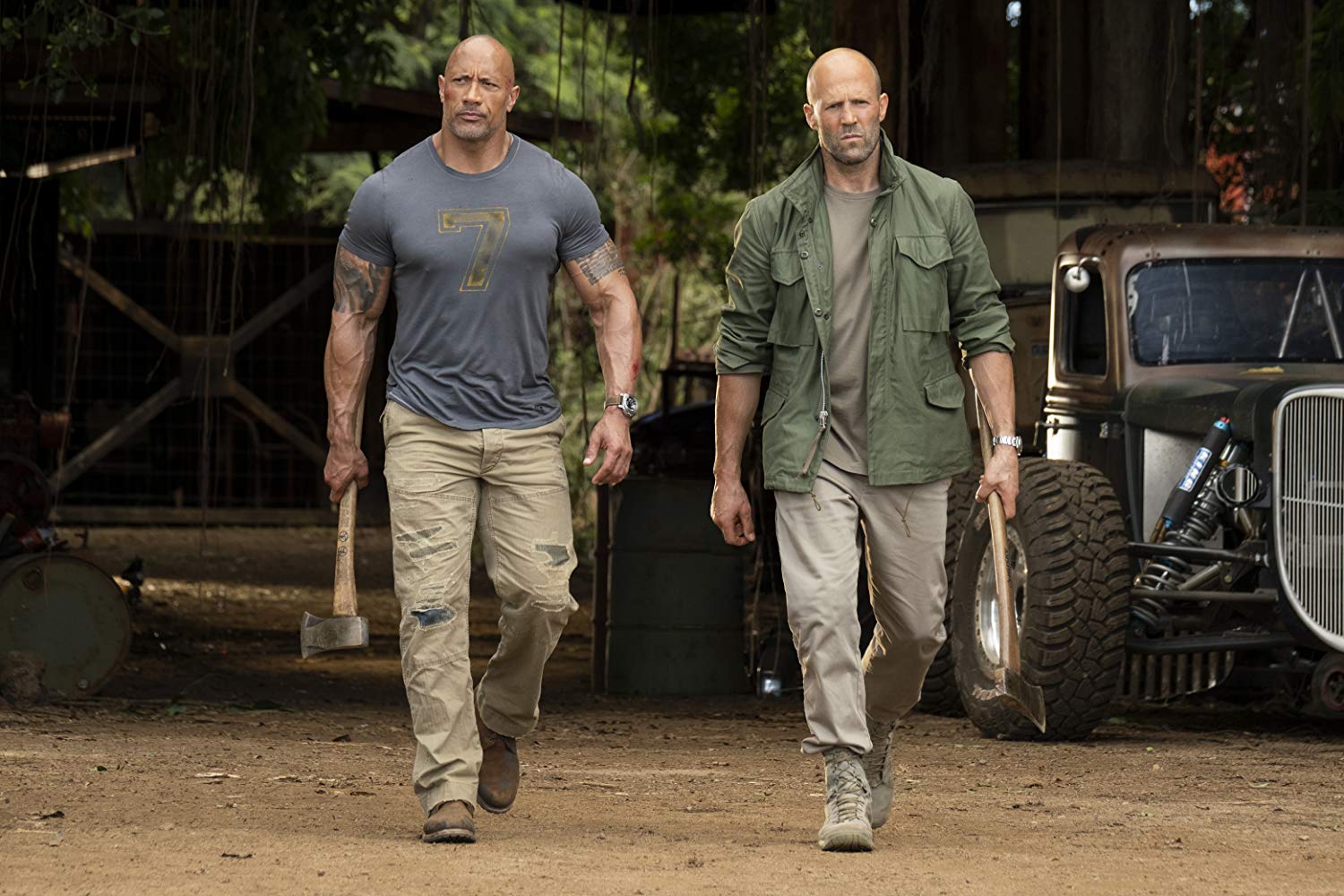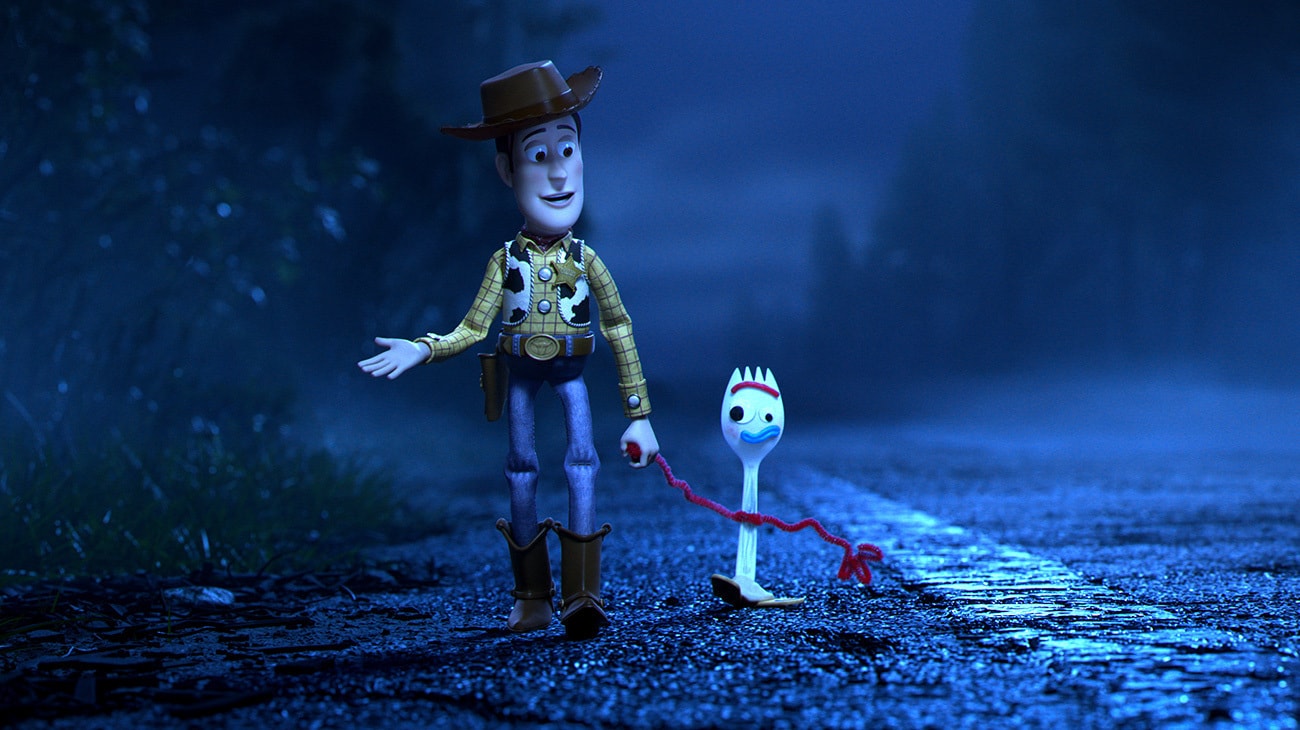
by Michael Foust | Aug 2, 2019
The film Hobbs & Shaw (PG-13) opens this weekend, giving us an ultra-violent but family-centric spinoff of the Fast & Furious series.
Luke Hobbs and Deckard Shaw are two muscular men who never
have gotten along.
They argue. They bicker. Most of all, they mock and dare one
another to take the first punch.
In other words, they’re the last two men you’d want teaming
up to save the world from a deadly virus.
Yet that’s exactly what the CIA has in mind. After all,
Hobbs and Shaw are very good at what
they do: beating up bad guys and fighting crime.
At first, Hobbs and Shaw refuse the proposal. But then Shaw
discovers his sister’s life is in danger. And then the two men learn the virus
has a 100 percent mortality rate. And then they realize a brilliant mastermind
wants the virus so he can wipe out Earth’s population and repopulate the planet
with a human-robotic hybrid race.
Perhaps these two men aren’t the ideal duo, but with the
world in peril, they’ll have to do.
The film Hobbs &
Shaw (PG-13) opens this weekend, giving us a spinoff of the Fast & Furious series with all the
things those popular movies delivered: high-speed car chases, more fisticuffs
than you can count, and over-the-top action that could happen only in a
Hollywood film (My personal favorites: the car driving through the skyscraper
and the tow truck battling a helicopter).
Like the Fast and
Furious movies, Hobbs & Shaw also
gives us a family-centric plot with a great message. But that doesn’t mean it’s
family-friendly. It has a ton of language and violence. And it has more jokes
about the male anatomy than I’ve ever heard in a film.
It stars Dwayne Johnson as Hobbs, Jason Statham as Shaw,
Vanessa Kirby as Hattie (Shaw’s sister) and Idris Elba as Brixton, a
human-robot hybrid who wants to spread the virus.
Warning:
minor/moderate spoilers!
(Scale key:
none, minimal, moderate, extreme)
Violence/Disturbing
Extreme. The film is wall-to-wall punches to the face,
punches to the stomach, and kicks to the groin. People get thrown out windows
and beaten up with metal chairs. Gunshots are prominent, and we see people fall
down, presumably dead. Cars explode. We see three torture scenes: two mild ones
and a third that includes men being shocked with jumper cables and a car
battery. The film doesn’t have excessive bloodshed, but it more than makes up
for it in other areas.
Sexuality/Sensuality/Nudity
Moderate. The film includes no nudity or bedroom scenes, but
we briefly see scantily clad women at a party (some in underwear-type apparel).
We see a man and a woman kiss twice. Shaw tells Hobbs not to mess with his
sister in the romance realm. Hobbs replies with an implicit reference to sex.
The film is full of innuendo about the male anatomy. We see Hobbs and other men shirtless.
Coarse
Language
Moderate/extreme. S–t (11), h-ll (8), a– (6), SOB (4), GD
(3), d–n (2), misuse of “Jesus” (2) and f-word (1 or 2)
Other
Positive Elements
For all its testosterone, Hobbs & Shaw is a movie about family, regret and redemption.
Hobbs would do anything for his nine-year-old daughter, although he is
estranged from his mother and brothers. Likewise, Shaw doesn’t have a good
relationship with his sister. I won’t spoil the plot for you, but the film has
a redemptive ending.
Other Stuff
You Might Want To Know
We see people drink alcohol.
Life Lessons
Family is
essential. It’s
fun watching a tough guy like Hobbs spend quality time with his daughter. It
reminded me of the old saying, “Anyone can be a father but it takes someone
special to be a dad. “
It’s never
too late to go home and make amends. Hobbs proves that’s the case.
Optimism is
always needed. Shaw,
despite his faults, is a positive person. This trait comes in handy when his
sister nearly dies.
Mothers
should be honored.
One major character gives us a good example of this.
Worldview/Application
The Fast and Furious
series always has delivered conflicting messages about women. On the one hand,
the series objectifies women. On the other hand, it holds up marriage and the
family unit as a priceless ideal.
“I spent my whole life running away,” Hobbs says. “… My
own daughter doesn’t even know her own family.”
“You can change that,” Hattie responds.
No, Hobbs & Shaw isn’t
a pro-family movie in the realm of the faith-based movie Courageous. But it’s nice to see a family-affirming message in a
PG-13 action flick.
What Works
The pro-family, redemptive message. The action. I’m a sucker
for car chase scenes. Hobbs & Shaw
delivers.
What Doesn’t
Could we cut down on the male anatomy jokes if there is a
sequel?
Discussion
Questions
1. Why is it sometimes difficult to make amends with family
members? What is the solution?
2. Both Hobbs and Shaw had major regrets about their past.
Do you? Is it possible to begin anew?
3. What, if anything, can Hobbs and Shaw teach us about
“loving your enemy”?
4. What was the key to Hobbs and Shaw learning how to get
along?
Entertainment rating: 3 out of 5
stars. Family-friendly rating: 2 out
of 5 stars.
Rated PG-13
for prolonged sequences of action and violence, suggestive material and some
strong language.

by Michael Foust | Jul 19, 2019
Disney’s ‘The Lion King’ opens in theaters this weekend. It’s a live-action remake that has plenty of family-friendly moments.
Simba is a young lion cub who can’t imagine life without his
father, Mufasa, the king of the pride lands.
“Dad, we’re pals, right?”
“Right,” his father tells him.
“And we’ll always be together,” Simba says.
Well, not exactly, but just like any good father, Mufasa
explains his future death in language that won’t shock his son.
Yet nothing can prepare Simba for what happens a few days
later.
Simba gets caught in a stampede of wildebeests. His father
rescues him, but then is killed due to a nefarious action of a jealous brother,
Scar.
Believing he is responsible for his father’s death, a
guilt-ridden Simba runs away from the only place he’s ever known, and Scar—a
power-hungry evil lion—takes the throne.
Disney’s The Lion King
(PG) opens in theaters this weekend, starring James Earl Jones as Mufasa, J.D.
McCrary as the young Simba, Donald Glover as the older Simba, Chiwetel Ejiofor
as Scar, Seth Rogen as Pumbaa, and Billy Eichner as Timon.
It’s a live-action remake of the 1994 animated film that won
two Oscars. Jones had the same role in that earlier film. Composer Hans Zimmer
also worked on both projects.
The film follows the same plot and, in some scenes, is
nearly an exact reproduction. But the remake is 30 minutes longer than the
original. It gets there by lengthening a few scenes and adding other ones that
were not in the 1994 movie.
Overall, the 2019 The
Lion King is an entertaining and well-done remake, although with a slower
pace at times. It’s a redemptive story about tragedy and triumph. Overall, it’s
superb.
Warning:
minor/moderate spoilers!
(Scale key:
none, minimal, moderate, extreme)
Violence/Disturbing
Minimal/moderate. The scenes seem more intense in a
live-action film. Hyenas chase a young Simba, trying to eat him. (“Kill him,”
Scar says.) Mufasa’s death is identical to the original, but the emotional
impact of Simba mourning over him is greater, as is Scar’s falsely blaming
Simba for the tragedy. The movie ends just like the first one, with hyenas and
lions battling and then two lions going one-one-one (and one lion falling off a
cliff toward a fire).
Sexuality/Sensuality/Nudity
None. Zazu, a red-billed hornbill, gives Mufasa his daily
report and says he saw two giraffes “necking.”
Coarse
Language
None/minimal. We hear one “my G-d” and one “farted.” The
latter takes place in Pumbaa’s song, Hakuna
Matata. In the original film, Timon places his hand over Pumbaa’s mouth,
preventing him from saying it.
Other
Positive Elements
Mufasa’s love and care for his son is admirable. It’s the
heart of the story. Meanwhile, Simba is just as cute and cuddly as the original
Other Stuff
You Might Want To Know
Watching Mufasa die, and Simba mourn over him, could trouble
children (or anyone) who has lost a parent (“Wake up,” Simba says).
Pumbaa passes gas.
Life Lessons
You can’t
change your past, but you can change your future. That’s what Pumbaa and Timon tell
Simba. It’s good advice.
Don’t answer
evil with evil: Simba
has a chance to kill Scar the same way Scar killed his father. Simba, though,
displays mercy.
Children are
a blessing: Mufasa
and Sarabi truly care for Simba.
Worldview/Application
The 1994 film and the 2019 version tell us there is a
“circle of life.”
But is there? Well, yes and no.
There certainly is
a circle of life in the physical realm. Just look at a forest through the
seasons: Trees bloom in the spring. Leaves turn green in the summer, and then
fall off in autumn. Then, on the ground, those decayed leaves provide
fertilizer for—you guessed it—new trees in the spring. The film illustrates
this by showing us a tuft of Simba’s fur changing ownership—from a bird nest,
to a giraffe’s accidental meal, to a dung beetle, to a leaf-cutting ant.
In the Kingdom or spiritual realm, though, there is no
circle of life. There is no reincarnation. We have a soul, and it spends
eternity either with or apart from God. This means Mufasa is spouting
real-world nonsense when he tells Simba that “the great kings of the past look
down on us from the stars” to guide us.
Mufasa comes close to the truth when he says of his land:
“It is ours to protect—a great responsibility.”
The Bible says we are stewards of the planet, entrusted to
treat it as we would our own home—with care.
Sponsors
McDonald’s, General Mills, Yoplait, Go-Gurt and Ocean Spray
are sponsors well-known to children.
What Works
The animal recreations. The interaction between Mufasa and
Simba. The tiny details, such as recreations of ants and worms.
What Doesn’t
The slower pace. The movie doesn’t drag, but there are a few
moments where the original movie easily outshines the newer version.
Discussion
Questions
1. What is the key to overcoming guilt about your past? What
does the Bible say?
2. Why was Scar jealous? Should he have been jealous? How
would the story have been different if he were supportive?
3. One character says “Life is meaningless.” How would you
have responded?
4. Is there a “great circle of life”?
5. Are our ancestors in the stars, looking down on us? What
does the Bible say?
Entertainment rating: 4 out of 5
stars. Family-friendly rating: 4.5
out of 5 stars.
Rated PG for sequences of violence and peril, and some thematic elements.
PHOTO CREDIT: Disney

by Michael Foust | Jul 5, 2019
The movie ‘Spider-Man: Far From Home’ has less violence and language than most Marvel films but still has a few scenes that may give parents pause.
Peter Parker is an average-looking high school sophomore who has the power to save the world from the latest evil villain.
Yet all he can think about is his crush, MJ.
As Spider-Man, he is as brave as a lion. As Peter Parker,
though, he is as scared as a mouse—especially around her.
Perhaps a class trip to Europe will give him courage. He and
his friends will tour Venice, Prague and Paris. They’ll see the sites. They’ll
learn the history. They’ll escape all their worries from home.
But nothing is ever easy for Peter Parker. A water monster
attacks Venice. Parker helps save the day, but then another villain, made of
fire, descends upon Prague.
Meanwhile, Avengers boss Nick Fury is trying to persuade
Parker to take on a larger role in the superhero realm.
And all Parker wants to do is ask MJ out on a date.
The movie Spider-Man:
Far From Home (PG-13) opens in theaters this weekend, picking up where Avengers: Endgame ended and continuing
the new Spider-Man saga begun by 2017’s Homecoming.
It stars Tom Holland as Parker/Spider-Man, Zendaya as MJ, Marisa Tomei as
Parker’s aunt and Samuel L. Jackson as Fury.
In Far From Home,
the world is mourning the death of Stark/Iron Man and Natasha Romanoff/ Black
Widow, and the retirement of Steve Rogers/Captain America.
“What is it like to take over for Tony Stark?” a reporter
asks Parker/Spider-Man, who has no desire to succeed the legendary hero.
A new superhero named “Mysterio” (Jake Gyllenhaal) then
arrives on the scene to help defeat Hydron and the other villains, leading
Parker to wonder: Is Mysterio the next Tony Stark?
Warning:
minor/moderate spoilers!
(Scale key:
none, minimal, moderate, extreme)
Violence/Disturbing
Moderate. Far From
Home has less violence and disturbing content than did Homecoming or most other Marvel movies, even though it still has
plenty of stuff blowing up or getting destroyed. The villains—part of a group
of bad guys called the Elementals—will give only the most sensitive children
and tweens nightmares.
Drones shoot guns. Hand-to-hand combat scenes are virtually
nonexistent.
Sexuality/Sensuality/Nudity
Minimal/moderate. The film’s most problematic moment
involves an adult female employee telling Parker (who is 16) to take his
clothes off in order to put on a new costume. It’s an odd moment. With Parker’s
pants down (he’s still wearing underwear), a male classmate walks in. He makes
a joke about Parker wanting to “hook up” with a random “European chick.”
Later, Happy Hogan references Parker renting an “adult”
movie in a hotel. Parker takes off his shirt and puts on his costume when MJ’s
back is turned.
Romance is a major theme of the film. A couple share a kiss
at the end.
Coarse
Language
Moderate. OMG (6), h-ll (4), a– (3), s–t (2), d—wad (1),
b–ch (1), d–n (1) and one unfinished f-word. It’s less language than most
Marvel films. A classmate flips off Peter.
Other
Positive Elements
Peter may be unsure about his future role, but he still puts
his life on the line to save others.
He says “thank God” twice. Perhaps it’s just an expression,
but it carries meaning among some moviegoers.
The humor, minus the caveats already discussed, is
family-friendly and truly funny.
At a bar, Peter drinks lemonade.
Other Stuff
You Might Want To Know
Characters drink alcohol at a bar.
The movie contains mid-credit and post-credit scenes. Both
are critical to the future of the
Spider-Man and Marvel series.
Life Lessons
Experience
brings wisdom: Peter
Parker seemingly proves he’s not ready for prime time when he misuses a weapon
and nearly kills a classmate who is interested in MJ (he launched the weapon on
accident). Fury becomes, well, furious. Yet Parker learns from his mistakes and
matures.
Mistakes can
be overcome: Parker
is distraught after he makes the biggest mistake of his young superhero career.
But he gets a second chance and fixes it.
Appearances
can be deceiving:
A major plot-spoiler is behind this lesson, but it’s significant.
Worldview/Application
Far From
Home
sparks a series of questions worth a discussion on the drive home. Such as:
What’s real and worth pursuing in this world? What only seems real… and should be rejected? Christ and His Kingdom are the
source of true goodness, peace and joy, yet there are literally millions of
other things in our world—money, sex and fame, among them—that promise joy… but
deliver exactly the opposite. They may appear innocent on the surface, but
they’re not.
What Works
The action. The plot. The humor. The toned-down violence and
language, which is welcomed.
What Doesn’t
A joke about an adult woman hooking up with a 16-year-old.
Discussion
Questions
1. How do you know what is real and worth pursuing in life?
2. What is required for wisdom? Can a young person have wisdom?
Can a young person be mature?
3. Why did Peter fail? What was the key to him overcoming
his mistakes?
4. What would you want your last words to be? Is there
something you would confess in your finals seconds, as several characters did?
Entertainment rating: 4 out of 5
stars. Family-friendly rating: 3 out
of 5 stars.
Rated PG-13
for sci-fi action violence, some language and brief suggestive comments.

by Michael Foust | Jun 28, 2019
The film Yesterday opens this weekend, telling the story of a singer who wakes up in a world where the Beatles never existed.
Jack Malik is a talented musician who has a great voice and
a flair for playing the guitar.
So far, though, few people have noticed. His late-night gigs
draw merely a smattering of applause. His appearance at a music festival
attracts a crowd of about 20—many of them friends.
“I can’t do this anymore,” he tells his manager and friend,
Ellie. “… This is my last gig.”
Then a miracle happens, seemingly straight out of a science
fiction novel.
Jack is hit by a bus at the exact moment Earth experiences a
brief worldwide blackout. He survives the crash but soon discovers everyone has
changed.
For starters, no one remembers the Beatles.
“When did you write that?” Ellie asks him after he sings a
tune by the ground-breaking group.
“I didn’t write it,” Jack says. “Paul McCartney wrote it.”
“Who?” she asks.
Jack searches his album collection for his Beatles records…
and comes up empty. He types “Beatles” into Google… and finds pictures of bugs.
Suddenly, Jack faces a dilemma: If no one on Earth can
remember Beatles songs, could he sing them and claim them as his own?
The film Yesterday
(PG-13) opens this weekend, telling the story of a man who supposedly becomes
the world’s most talented musician by singing songs written by someone else. It
stars Himesh Patel as Jack, Lily James (Cinderella)
as Ellie, singer Ed Sheeran as himself, and Kate McKinnon as his new manager.
The film is part-science fiction and part-comedy, mixed with
a parable-type plot about honesty, money, fame and love.
At first, Jack is incredulous about his situation. But once
he becomes a superstar, the weight of his fame becomes unbearable. The studio
slaps a label on his album stating, “All songs, music and lyrics by Jack Malik
only.”
“I feel like I’ve become the definition of living a lie,” he
says.
Warning:
minor/moderate spoilers!
(Scale key:
none, minimal, moderate, extreme)
Violence/Disturbing
None.
Sexuality/Sensuality/Nudity
Minimal/moderate. Jack and Ellie have a budding romance,
although it began as “just friends.” We see them kiss passionately one night
but Ellie (still clothed) walks out of the bedroom, not wanting a one-night
stand. “It’s not for me.” Later, though, they presumably do sleep together (We
see them kiss before the scene cuts away). Someone makes jokes about them
“making sweet love” (they weren’t at the time). Ellie wears several low-cut
dresses. Sheeran’s song Shape of You
is heard.
Coarse
Language
Moderate. Misuse of “Christ” (5), d–n (4), misuse of “God”
(3), OMG (3), GD (2), s–t (2), h-ll (2), a– (1), misuse of “Jesus” (1). We
also hear the British word “bloody” (4).
Other
Positive Elements
Jack comes from a stable, loving home. His parents support
his musical ambitions. Ellie refuses to sleep with Jack on a one-night stand
(although they later sleep together before marriage). Jack’s friends care for
him when he is discouraged; they buy him a new guitar.
Other Stuff
You Might Want To Know
Jack, Ellie and their friends drink alcohol.
Life Lessons
Sin doesn’t
bring lasting happiness: Jack achieves his dream of becoming a famous musician yet
cannot enjoy it because of his lies.
Your sins
will find you out: I
won’t ruin the ending, but Jack isn’t the only person on the planet who
remembers the Beatles.
Fame and
money aren’t the key to joy: Jack discovers this in a big way.
Confession
is good for the soul: Jack wants to tell someone his secret. Finally, he does.
Worldview/Application
Yesterday implies God had a role in the
science fiction-type plot.
“I think the accident was a message from God,” Ellie tells
Jack after he gets hit by a bus. “Yeah, He was very angry.”
“You think me getting hit by the bus was God’s way of
telling me not to go back to teaching?” he asks.
“Exactly!” she responds.
And before the accident, the two have a back-and-forth
conversation about miracles.
“It would take a miracle (to become a successful singer),”
he says.
“Miracles happen,” Ellie says.
The film implies that God was testing Jack to see if he
would do the right thing.
Yesterday can spark a deep discussion about
morality: Would we lie if we knew we’d never get caught? What is our motivation
for obeying God’s law? Can a life built on sin bring true joy?
What Works
The plot. The acting. The ending. Good, original movies are
rare in Hollywood. This one fits both marks.
What Doesn’t
Kudos to the film’s writers for having Ellie reject a
one-night stand. That message would have been even more powerful if she had
waited until after they were married.
Discussion
Questions
1. If you woke up in a world like Jack’s world, what would
you do? Did he do the right thing?
2. Is our sin always discovered, sooner or later (Numbers
32:23)? Name famous examples of that from history. Are there any examples in
your own life?
3. Does money and fame bring joy? Why or why not?
4. Why was Jack unable to enjoy his fame?
Entertainment rating: 4 out of 5
stars. Family-friendly rating: 3 out
of 5 stars.
Rated PG-13
for suggestive content and language.

by Michael Foust | Jun 21, 2019
The Disney/Pixar film Toy Story 4 (G) opens this weekend, telling the story of an odd-looking toy named Forky who brings a little girl joy.
Bonnie is a timid little girl who doesn’t want to start
kindergarten.
She hides behind her bed on the first day of school. She
begs her parents not to make her go. And when she arrives at class, she sits
alone and cries.
That’s OK, though, because her toy doll, Sheriff Woody, has
tagged along to help, without her knowledge.
He stealthily climbs out of her backpack, finds a few
crayons and craft supplies (from the trash), and tosses them her way. Bonnie
picks them up, fastens a plastic spork and beady eyes to pipe cleaner, and—voila!—creates a strange-looking “doll”
she calls Forky.
Forky quickly becomes her favorite toy, even he feels out of
place.
“I am not a toy. I am a spork. I was made for trash,” Forky
says.
Forky has a propensity to throw himself in the garbage.
Woody, realizing the importance of Forky to Bonnie’s happiness, always rescues
him. It’s a full-time job, similar to a parent keeping a crawling toddler out
of trouble.
Yet Forky eventually escapes—tossing himself out of an RV
window during a family road trip. Woody jumps out of the window, too, hoping to
find Forky and convince him to accept his new identity. There’s also the
not-so-small problem of catching up with a speeding RV at the next campground.
Will Woody and Forky ever see Bonnie again?
The Disney/Pixar film Toy
Story 4 (G) opens this weekend, nine years after its predecessor, Toy Story 3, ended with Bonnie receiving
a box of toys from the previous owner, Andy. It stars Tom Hanks as Woody, Tony
Hale as Forky, Madeleine McGraw as Bonnie, Tim Allen as Buzz Lightyear and
Annie Potts as Bo Peep. The late Don Rickles even makes an appearance as Mr.
Potato Head.
The series tells the story of toys that come to life when
their owner isn’t in the room. They exist for only one thing: to bring children
joy.
“You are going to help make happy memories that are going to
last for the rest of her life,” Woody tells Forky.
The movie has a series of new characters and voices,
including Forky, Bunny and Ducky (Jordan Peele and Keegan-Michael Key,
respectively), and the Canadian stuntman Duke Caboom (Keanu Reeves).
The film follows Woody and Forky as they search for Bonnie
but get sidetracked and then sidelined in an antique store.
Toy Story 4 is a worthy addition to the Toy Story series, even if it’s not as
good as its predecessors (Although some would say that’s debatable).
It’s also a perfect family film. It has no language and no
sexuality. It includes a couple of semi-disturbing moments, but the violence is
minimal.
Like all Pixar films, it includes serious lessons about
life.
Warning:
minor/moderate spoilers!
(Scale key:
none, minimal, moderate, extreme)
Violence/Disturbing
Minimal. The film’s most disturbing moments involve
spooky-looking ventriloquist dummies in an antique store. It stays in G-rated
territory, although the dummies—who chase Woody and the others—may trouble
sensitive children. Buzz Lightyear gets punched in the head a few times by two
new characters. Bo Peep gets her arm pulled off (It’s bloodless and played for
laughs). Later, she uses her staff to hit a few people.
Sexuality/Sensuality/Nudity
None. The romance between Woody and Bo Peep escalates. They
don’t kiss, but they do hug.
Coarse
Language
None. Not even a “gosh.” The most we hear is a “gosh,”
“lucky” and “good luck.”
Positive
Elements
Bonnie comes from a loving family, and we see her mom and
dad several times. Woody’s loyalty to Bonnie and the other toys is commendable.
He serves as a father figure to them.
Other Stuff
You Might Want to Know
Woody and Buzz Lightyear discuss the importance of listening
“to your inner voice” (See Worldview, below).
Life Lessons
Loyalty is
honorable. For
Woody, loyalty is a doll’s purpose, and he risks his life multiple times to
find Forky for Bonnie.
Change is
inevitable. Yes,
that’s one of the themes of the entire series, but Toy Story 4 takes it to another level with Woody, who eventually
finds purpose in life after being placed in a closet. Bonnie, too, is
experiencing change.
Humility can
bring purpose. Woody
is searching for meaning in life after being set aside for other toys. He seems
to find it through a series of selfless actions.
Different is
OK: Forky
is different from the other toys. Very
different. But Woody—like a friend to the new kid in the neighborhood—introduces
Forky to the other toys and defends him. No one ever bullies Forky.
Worldview/Application
How do we receive guidance each day when important decisions
arise? Woody thinks he knows. He listens to the “voice” inside of him—the voice
that “tells you … what you’re really thinking,” he says. At first, Buzz
Lightyear doesn’t understand what Woody is referencing, but by the end of the
film, Buzz is on board when they’re confronted by a critical matter.
“Listen to your inner voice,” Buzz tells Woody.
But such advice can lead to disaster in the real world. What
if that inner voice conflicts with God’s will? What if it’s wrong?
God speaks to us primarily through the Bible, but also
through prayer and the Holy Spirit. We should train our “inner voice” to align
with God’s “voice”—not our own.
Partners
Toy Story 4 has more than a dozen partners.
Among them: McDonald’s, Kellogg’s, Danimals and Juicy Juice.
What Works
The new characters (I could have taken more Forky). The emphasis on loyalty. The humor. (Bonnie exclaims
after the first day in school: “I finished kindergarten!”)
What Doesn’t
Some moviegoers will love the ending. I didn’t.
Bo Peep’s outlook on life also deserves inspection. Had she
found purpose in the midst of tragedy? Or had she become anti-kid? (“Who needs
a kid’s room when you can have all this?”)
Discussion
Questions
1. Should we listen to our “inner voice”?
2. Did Woody make the right decision in the end?
3. Is loyalty always a virtue?
4. What is the “secret” to finding purpose?
5. What does Toy Story
4 teach us about accepting those who are different?
Entertainment rating: 3.5 out of 5
stars. Family-friendly rating: 5 out
of 5 stars.
Toy Story 4
is rated G.
PHOTO CREDIT: Disney




